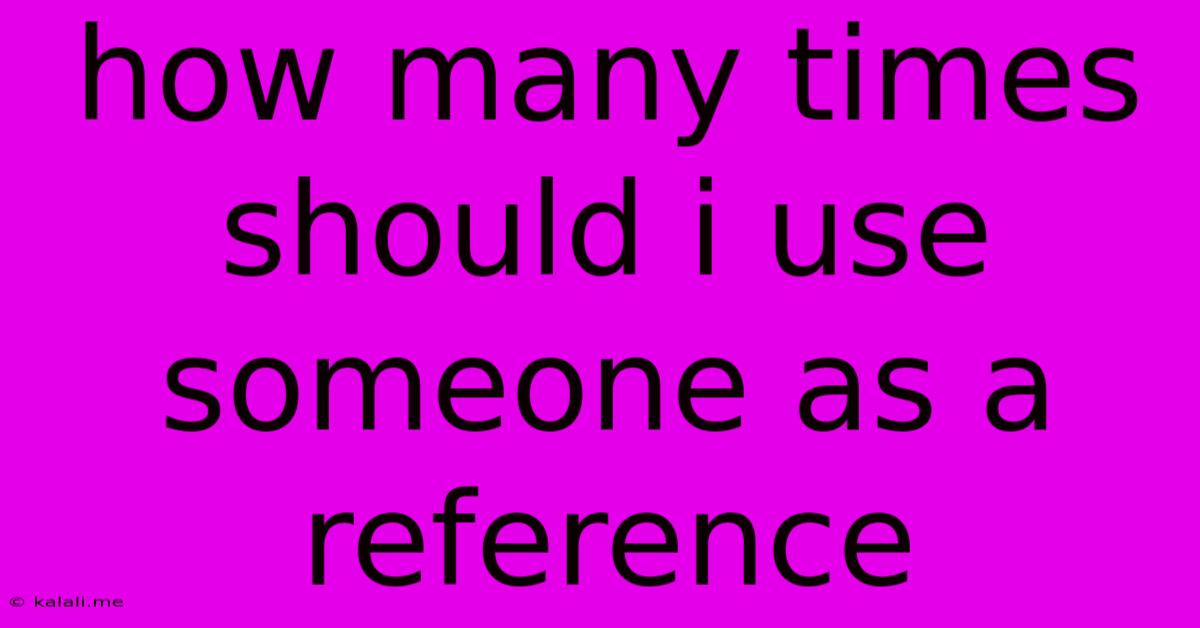How Many Times Should I Use Someone As A Reference
Kalali
Jun 08, 2025 · 3 min read

Table of Contents
How Many Times Should You Use Someone as a Reference? A Guide to Professional Networking
Choosing the right references is crucial for career advancement, whether you're applying for a job, seeking a promotion, or pursuing further education. But how many times is it appropriate to use the same individuals as references? This article explores the etiquette and best practices surrounding reference usage, helping you navigate professional networking effectively.
This guide will help you understand the nuances of using references, ensuring you maintain positive relationships while maximizing your chances of success. We'll cover how frequently you should ask for recommendations, the importance of reciprocity, and the best ways to express your gratitude to your references.
The Fine Line: How Often is Too Often?
There's no magic number dictating how many times you can use a reference. The appropriateness depends on several factors, including:
- The strength of your relationship: A close mentor or long-term colleague might be more comfortable providing multiple references than a casual acquaintance.
- The nature of the requests: Repeated requests for similar positions within a short time frame might be perceived as excessive. Using the same reference for vastly different roles is generally acceptable, provided the reference has relevant experience with your skills.
- The reference's availability and willingness: Always prioritize the well-being and availability of your references. If they seem burdened or hesitant, respect their boundaries and seek other options.
- The context of the request: Using a reference for a high-stakes opportunity, like a prestigious fellowship or a significant career leap, is different from using them for a minor internal promotion.
General Guideline: While there's no hard rule, using the same reference more than three to four times within a year might be considered excessive. It's crucial to maintain open communication and ensure your references aren't feeling overused.
Maintaining Positive Relationships with Your References:
The key to successful reference utilization is building and maintaining strong, reciprocal relationships. This involves:
- Providing updates: Keep your references informed about your career progress. Share successes, challenges, and any relevant information related to their recommendations.
- Expressing gratitude: Always express sincere appreciation for their time and support, both before and after using their reference. A thoughtful thank-you note or email goes a long way.
- Offering reciprocity: Be prepared to offer support to your references whenever possible. This could involve providing references for them, offering assistance with their projects, or simply being a supportive colleague.
- Respecting their time: Never make unreasonable demands on your references' time. Provide them with all the necessary information well in advance of deadlines, and always keep your requests concise and professional.
Building a Strong Network of References:
Instead of relying heavily on a few key references, cultivate a diverse network of contacts who can speak to your skills and experience from different perspectives. This reduces the strain on any single individual and enhances your overall application.
Diversifying your reference pool allows you to tailor your references to specific job opportunities or academic pursuits.
Conclusion: Strategic Reference Management
The number of times you use a reference is less important than the quality of your relationships and the strategic approach you take. By prioritizing communication, expressing gratitude, offering reciprocity, and diversifying your network, you can leverage your references effectively while maintaining strong professional relationships. Remember that your references are valuable assets; treat them with respect and appreciation.
Latest Posts
Latest Posts
-
How Deep Does A Ground Rod Need To Be
Jun 08, 2025
-
How To Know If A Fish Is Dead
Jun 08, 2025
-
How Long Before Staining Treated Wood
Jun 08, 2025
-
Smoke Coming Out Of Car Ac Vents
Jun 08, 2025
-
Does The Devil Have A Son
Jun 08, 2025
Related Post
Thank you for visiting our website which covers about How Many Times Should I Use Someone As A Reference . We hope the information provided has been useful to you. Feel free to contact us if you have any questions or need further assistance. See you next time and don't miss to bookmark.